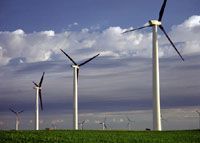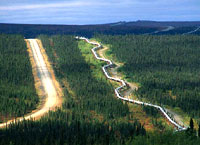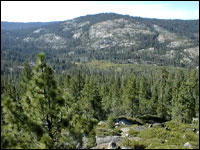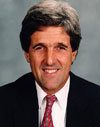It takes only the first raw scent of the smoldering piles of debris at Ground Zero and a quick glance at the guts of the blasted, black-charred remains of the World Trade Center to immediately agree with President Bush that the Sept. 11 attacks were a direct strike at what he called “the American way of life.”

America, the solar-powered?
Bush’s assessment, meant to stir public passion and lay the political foundation for a sustained military campaign to eradicate global terrorism, has also had another, quite different effect. Spurred by the president’s regular reference, the American way of life is suddenly the focus of new public scrutiny and a substantive national discussion about who we are and how we live.
With so many Americans dead on their own soil, the terrorist attack in effect opened a new chapter in a decades-old skirmish about the real meaning of national security and the consequences of a way of life based on the profligate use of oil and other natural resources.
The debate, which has taken on unprecedented urgency, could dramatically reshape American politics and economics, perhaps as soon as the 2002 mid-term election. Moreover, say theorists on all sides of the dispute, never before has the environmental community had the opportunity to play such an influential role in deciding the outcome. The reason: To the extent the horrendous attacks were prompted by America’s oil dependency and its unwelcome presence in the Middle East, the environmentalists’ vision of a more energy-efficient, less resource-dependent way of life is the most cogent long-term response yet put forward about how to truly strengthen national security.

Alternative energy sources blow into
the limelight.
Photo: NREL.
If something heartening has come out of the Sept. 11 tragedies, it is that this vision is no longer limited to environmentalists. With energy security on everyone’s mind, solutions that have long been advocated by environmentalists — renewable and alternative energy sources, and dispersed as opposed to centralized generation — are suddenly being touted even by some who have traditionally been far from eco-friendly.
In large part, environmentalists can take the credit for this as well. Movement leaders have been thinking about the foreign and domestic consequences of U.S. energy policy for years; in the wake of Sept. 11, they mobilized fast to share those thoughts with the public. Even some conservatives were impressed.
“The ability of the environmental community to regroup after Sept. 11, and regain momentum around the debate over energy in particular, shows confidence and sophistication in reaching a national audience,” said Fred Smith, president of the Competitive Enterprise Institute, an influential Washington, D.C.-based libertarian research and policy organization. “It shows a skill level that is admirable.”
But conservative thinkers haven’t just been impressed by environmentalists’ strategy; some of them, recently, have also been impressed by environmentalists’ policy.
Nonsense and Sensibility
The main proving ground for post-Sept. 11 energy policy has been the Arctic National Wildlife Refuge. Republican leaders in Congress and their allies in the energy industry hope to open the refuge to oil drilling, a move that is vehemently opposed by environmentalists. Bill Bush, a spokesman for the American Petroleum Institute, an industry trade association in Washington, D.C., said, “We believe we’re going to need more oil and gas in the future, regardless of what else we do. There are reasons it makes sense to develop in Alaska. It’s a secure supply and we believe it can be done safely.”

The long and winding pipeline.
Photo: ArtToday.
Environmentalists, however, say Alaska oil would be far from secure: They point out that last month, a single drunken man managed to puncture the trans-Alaskan pipeline by firing a rifle at it, causing a 285,000-gallon oil spill. As for supply, the United States Geological Survey and the Union of Concerned Scientists, a technical research group in Washington, D.C., note that at peak production the Arctic National Wildlife Refuge may yield only 500,000 barrels per day. The U.S. uses 19.45 million barrels of oil daily, according to the Department of Energy, or more than a quarter of global production.
In other words, the United States cannot drill its way out of oil dependence. A more rational response to energy insecurity, say environmental groups, is to focus on alternatives to oil and other fossil fuels, and to reduce demand. Improving the average fuel economy of American vehicles by just 3 miles per gallon, for instance, saves 1 million barrels of oil daily, according to the Union of Concerned Scientists, or twice what would be produced in the refuge.
These arguments are not new, but some of their advocates are. Jerry Taylor, director of natural resource studies for the Cato Institute, a libertarian think tank in Washington, D.C., said, “The environmentalists are right. A lot of conservatives buy into the analysis made by most pro-business groups that without ANWR we are vulnerable to the oil weapon. But you can’t make that case on the grounds of national security. The idea that you can protect yourself from Middle East production behavior by pumping oil out of Alaska is nonsense. There just won’t be enough production there to make a difference.”
Terrorism Is Scarier Than Global Warming
Progressives and some conservatives agree that terrorism lends a graphic sense of urgency to environmental problems that more amorphous long-term global environmental threats like climate change were unable to conjure.
Precisely for that reason, there hasn’t been a better opportunity to incorporate a green vision in national policy since the great decade-long period of national environmental policy-making from the late 1960s to the late 1970s. Even before Sept. 11, environmental leaders were calling attention to an important shift in American priorities. Public opinion polls and 2000 election results indicated that many more Americans valued environmental safeguards, public health protections, and good government reforms designed to achieve both.

California’s Bell Meadow Roadless
Area is protected (for now).
Photo: BLM.
In recent interviews, both conservatives and environmentalists noted that the president’s low polling numbers prior to Sept. 11 were due in large measure to Bush’s disregard for environmental safeguards and his administration’s efforts to weaken standards for arsenic in drinking water, undo Clinton-era protections for nearly 60 million acres of wilderness, and abandon international treaty negotiations to curb global warming.
The polls, which also demonstrated the public’s declining esteem for the right-wing leadership in Congress, indicated that voters viewed the conservative message of lower taxes, less government, and opposition to abortion and gun control as out of touch. In a world where the American economy was shrinking, and concern about health care, education, traffic congestion, and environmental degradation were rising, the public understood that the solution was not more tax breaks for the rich, deregulation, subsidies for big industry, and neglect. The new priorities required a community response overseen by an engaged national
government.
The Sept. 11 attacks have raised the stakes in the battle for effective government. In no arena are the choices more starkly apparent, or the chance for a progressive victory more readily attainable, than in the debate over energy.
Immediately after the attacks, Democratic support for a more sensible energy strategy was weakened by many members’ fear of being tarred by the right as unpatriotic. Republican leaders and the president, arguing that opening the Arctic Refuge was a national security concern, sought to capitalize on this fear and simultaneously avoid a public debate by trying (unsuccessfully) to attach to new security and tax legislation a House bill that would open up the refuge to oil exploration as well as provide $27 billion in taxpayer-funded subsidies to oil, coal, natural gas, and nuclear producers.

Kerry on! The senator
has promised to
filibuster.
In recent weeks, though, Democratic resolve has stiffened. Sen. Tom Daschle (D), the South Dakota majority leader, has blocked a vote on the energy bill until it can be fully discussed. And Sen. John Kerry, a Democrat of Massachusetts, vowed to lead a filibuster if the House energy bill somehow made it to the floor of the Senate.
In a speech in early November to the League of Conservation voters in New York, Kerry called the House energy bill “a charade.” He added: “We’re remembering the acts of those average, everyday Americans who went in that building and ran up some 40 flights with hoses over their backs to rescue people, and police officers who went in to maintain order in our country. There is somehow something grotesquely inappropriate in $20-plus billion in subsidies to oil and gas that are giveaways.”
Meanwhile the environmental community is making the case to its membership and the media that energy interests are trying to loot the treasury and that an entirely new kind of energy strategy is warranted. Gregory Wetstone, the program director of the Natural Resources Defense Council, said his group alone has generated 510,000 email and fax messages to Congress in support of a more economically efficient, environmentally sensitive, and secure energy plan.
He said, “The Sept. 11 attacks added a new dimension to what the environmental community has been saying for years, because it is increasingly clear that we have to move beyond oil to find security, and not just energy security.”

